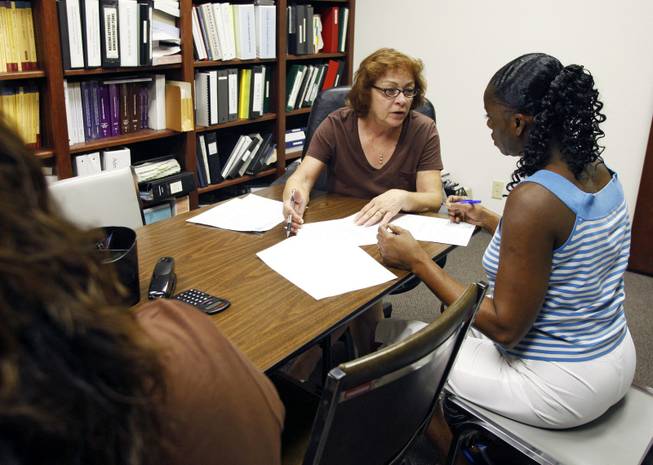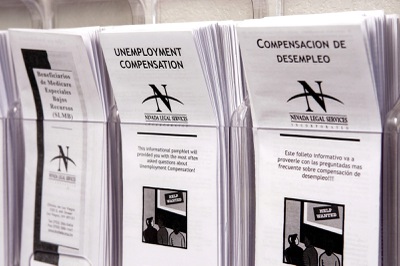
Paralegal Mary Lou Perez, left, helps client Angela Black fill out paperwork for a landlord-tenant problem at Nevada Legal Services on Sept. 11.
Friday, Sept. 18, 2009 | 3 a.m.
Sun Coverage
The slumping Las Vegas economy has increased demand for free legal services and stretched the resources of agencies trying to provide those services.
Nevada Legal Services, the Legal Aid Center of Southern Nevada and Senior Citizens Law Project have reported many more requests and say it’s hard to meet the demand.
“It is overwhelming,” said Lynn Etkins, development director of Legal Aid Center. “Our lobby is filled with clients ranging from victims of domestic violence to people losing their homes and jobs. With the economy and layoffs, we have a lot more people in the community (who need) our services.”
This year has seen a 25 percent increase in placements with pro bono attorneys. A consumer hotline has received 14 percent more calls than a year ago, she said. Demand has increased for help with divorce, consumer credit, bankruptcy and other issues, Etkins said.
“We don’t see any letup with the economic crisis as far as clients are concerned,” Etkins said. “We just try to keep up and help the greatest number we can.”
Through the end of June, Nevada Legal Services had closed 2,600 cases, about 1,000 more than through the same six-month period in 2008.
“With the economy, the number of people coming through our doors is skyrocketing,” Executive Director AnnaMarie Johnson said. “It’s terrible to say but when the economy is bad, our business is good and we don’t see any slacking off in the demand for our services.”
Housing-related issues make up most of the caseload, including Section 8 and foreclosures, Johnson said. But there are too many people and too many issues, and the agency had to tighten priorities.
Nevada Legal Services’ Tenants’ Rights Center, where people get legal advice, saw about 50,000 people in 2008 in Clark County and its Family Law self-help center served more than 100,000, Johnson said. The agency does that on a $2.6 million budget.
“It is like triage, and we have to take cases that are truly an emergency for someone who would truly be homeless,” Johnson said. “With only nine attorneys in Las Vegas and an estimated 350,000 poor people who are eligible for services, we can’t help everybody. It is very frustrating.”
Etkins said income limits for most assistance are $2,000 a month for a single person and $2,860 for a family of four.
Nevada Legal Services operates four offices: Las Vegas, Reno, Elko and Carson City. Housing issues, which include evictions, foreclosures and denial of Section 8 vouchers or termination — comprised about 55 percent of its workload in 2008 and are running about the same this year, Johnson said.
Unemployment benefit cases have gone from 9 percent to 17 percent of the workload. The office represents people who have applied for benefits and have been denied, she said.
With six legal services agencies operating statewide, the organizations coordinate to make sure they don’t overlap in what they provide, Johnson said. Both Nevada Legal Services and Legal Aid Center handle mortgage foreclosures because of the large number of cases.
Nevada Legal Services handles welfare, unemployment, Medicare and Medicaid cases while Legal Aid’s caseload includes domestic violence, family law and Social Security benefits.
The upswing in demand has prompted the need for more attorneys to take pro bono cases.
Nevada State Bar President Kathleen England admits it is more difficult for lawyers to provide as much pro bono work because they aren’t in the same economic position as before.
“We have actually been lucky in the number of attorneys volunteering their service, but some attorneys who have been strong supporters in the past can’t do as much as they used to,” Johnson said. “They do need paying clients.”
More than half of the revenue for Legal Aid Center’s $4 million budget comes from court filing fees. It has a permanent staff of 45 and 22 full-time attorneys.
In cases where people can’t be helped, classes held in conjunction with Boyd Law School teach people to represent themselves, Etkins said.
“We are swamped and everybody has a maximum caseload,” Etkins said. “The intake staff is taking the brunt of it. Paralegals are meeting and talking with everyone who comes through our doors.”
Some of the biggest increases have been in consumer issues such as credit card debt and payday loan collections. Problems with foreclosures, the need for bankruptcy attorneys and all issues that relate to the recession have also jumped, Etkins said.
“There are a lot of people struggling to make ends meet,” Etkins said. “If they are taking out a payday loan and trying to pay bills and have medical expenses and then they are laid off, they are unable to pay those back.”
Attorneys work with them to ensure collection proceedings are done correctly, and if they are sued the attorneys help them answer complaints in court, Etkins said. In some cases, people had wages garnished and didn’t even know they had a lawsuit filed against them.
“There are a lot of complicated issues, especially if they are not educated and they don’t know what to do, and we are the only place they can go,” Etkins said.
The Senior Citizens Law Project, whose $1.2 million budget is funded in part by Las Vegas, serves people 60 and older and focuses on those with the greatest need with its three full-time attorneys.
The demand has been constant and overwhelming with seniors facing abusive practices by collection companies and an increase in elder abuse cases, Director Sugar Vogel said.
There are many cases of relatives and caregivers cleaning out bank accounts of a sick, elderly person who trusted them. They may also be physically abused, she said.
“When the economy is like this, our business is more expansive,” Vogel said. “In these tough times, we are more concerned than ever because they are in danger. They are the most vulnerable of our citizens.”
Some services includes helping people with estate planning, preparation of health care directives and more recently a greater focus on stopping creditors from hounding them with attempts to collect on credit card debt and writing it off, she said.
“Most seniors have always lived on limited income and they have secured part-time jobs to supplement their income,” Vogel said. “And with (retirement plans) plummeting, more people were forced to take a job. But with the (recession), it is hard to get a job.”



Join the Discussion:
Check this out for a full explanation of our conversion to the LiveFyre commenting system and instructions on how to sign up for an account.
Full comments policy